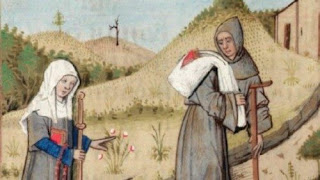Although she spent three months in Venice along the way as well as time in Jerusalem, she records very little of what she saw; she was more interested in telling about conversations she had with Jesus along the way (well, she did mention falling off her donkey because she was so overcome with emotion at the sight of Jerusalem). She stayed in Assisi on the way home, visiting many churches. When she got home, she decided on a pilgrimage to Santiago de Compostela.
On these trips (and when home in England) she had several negative reactions to her manner. She engaged in loud prayer and wild gesticulating, and her tears flowed constantly. Some found her actions the symptoms of a madwoman, or simply a public nuisance. The mayor of Leicester called her a cheap whore. accused her of Lollardy, and put her in prison for three weeks. She was later accused of heresy in York, but the archbishop of York cleared her.
She visited many religious figures, such as Archbishop of Canterbury Thomas Arundel, and the female mystic Julian of Norwich, where she stayed for several days. Margery claims that Julian supported her and assured Margery that her visions were real and valid and that her tears were a sign of real devotion.
We know all this because in the 1420s she asked a priest to take down her story, producing the Book of Margery Kempe (you can read it on the website of my hometown university here). She continued to have the manuscript amended. A copy was made of it just before 1450 by a monk, after which it disappeared. Margery Kempe died some time after 1438, and was quickly forgotten.
Five centuries later, the manuscript...well, let's wrap this up tomorrow when the 20th century discovered Margery Kempe.




